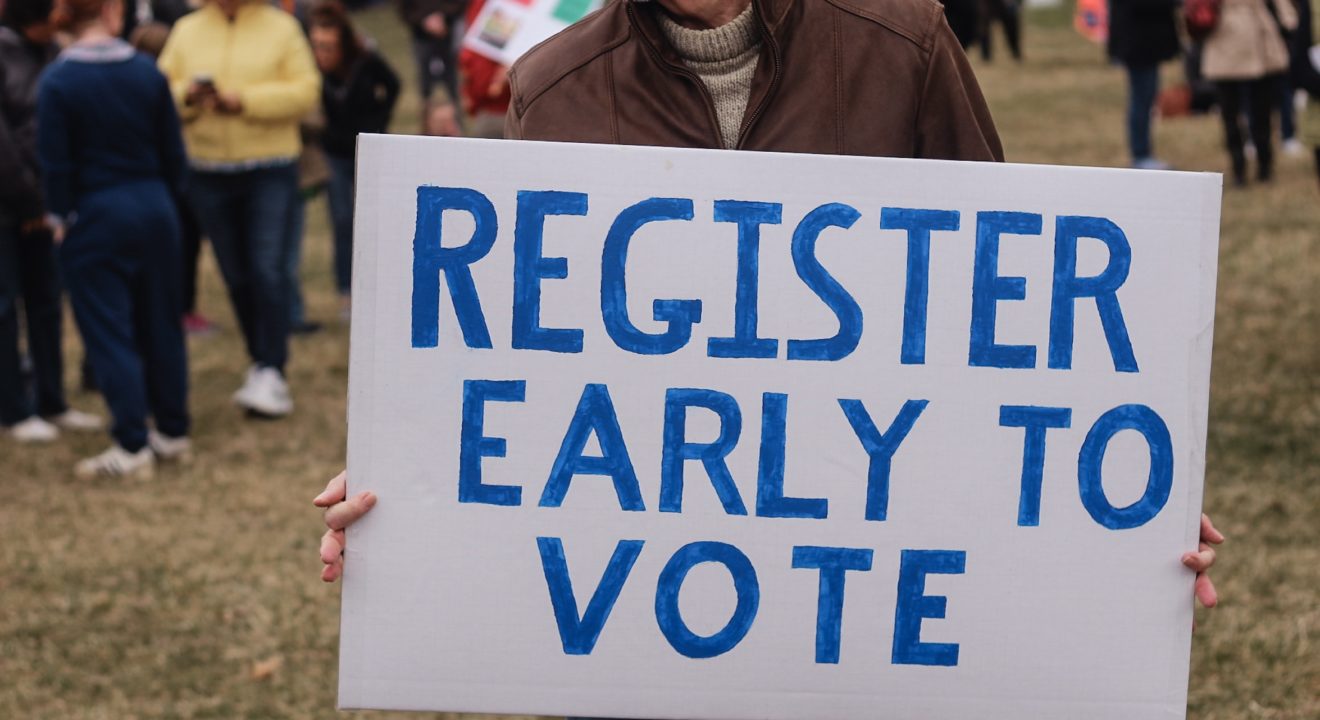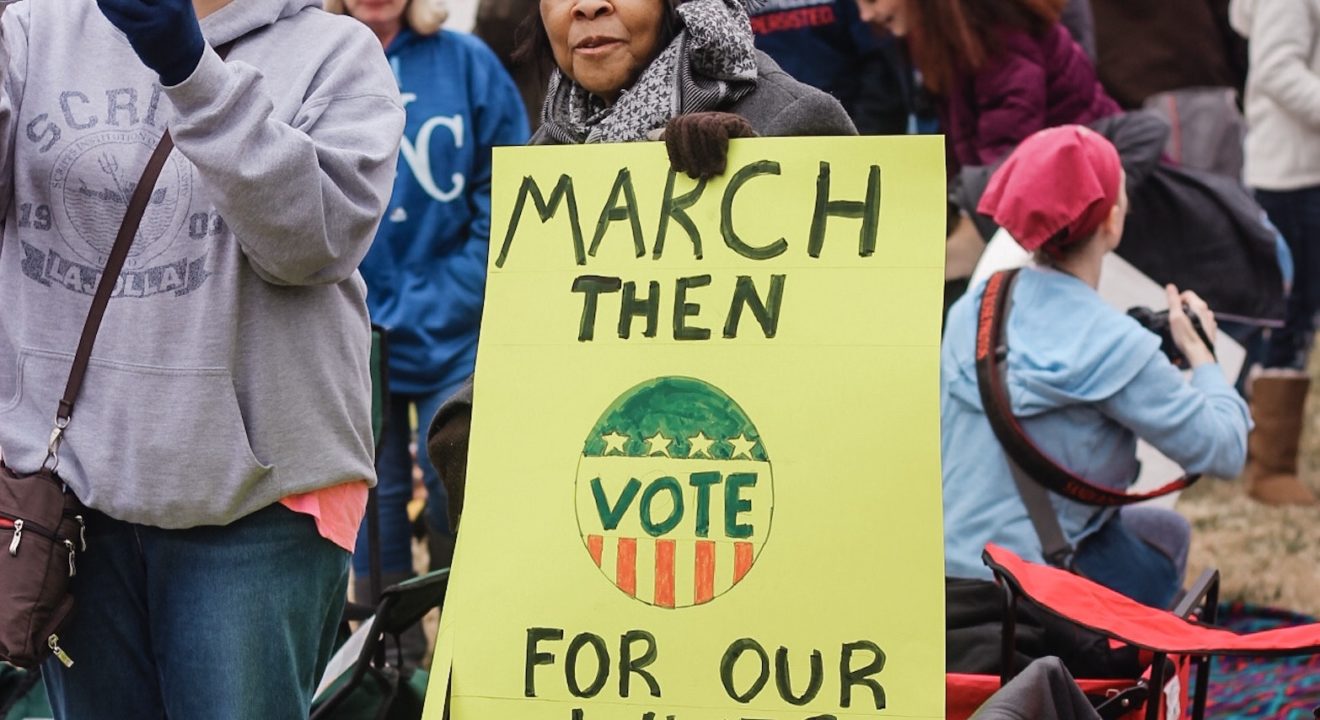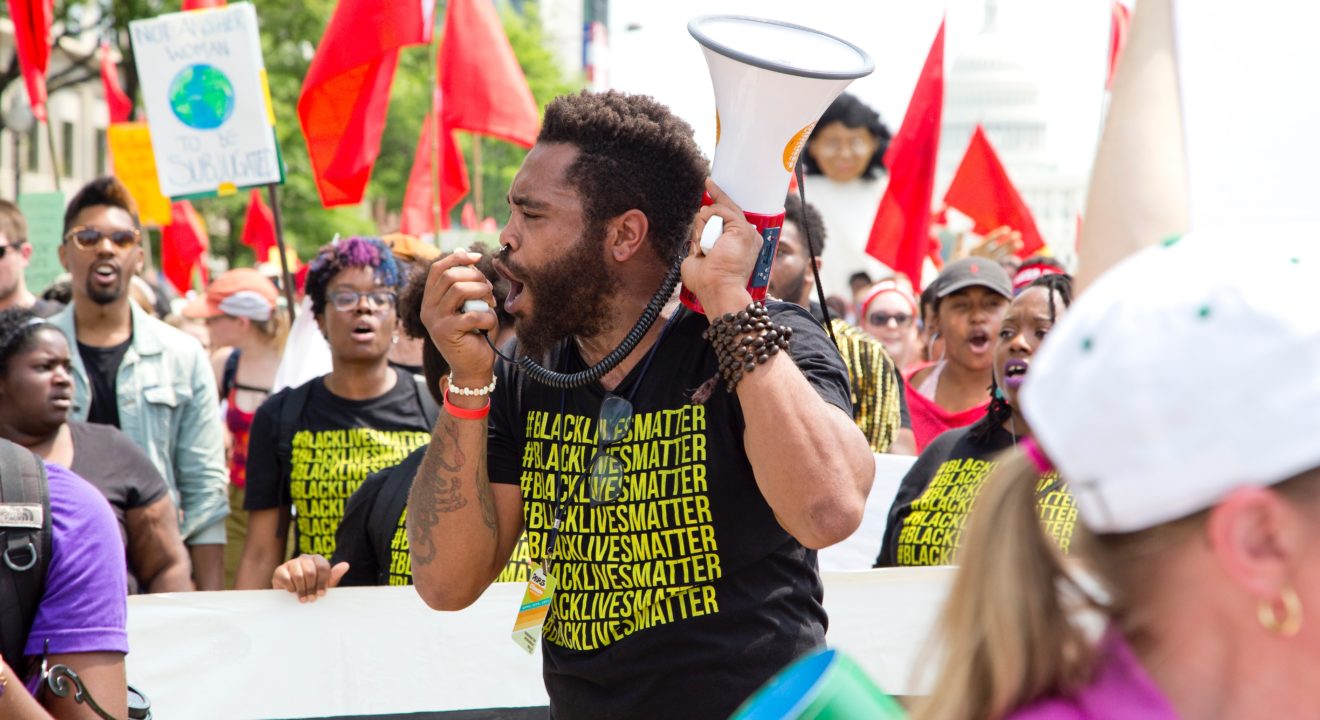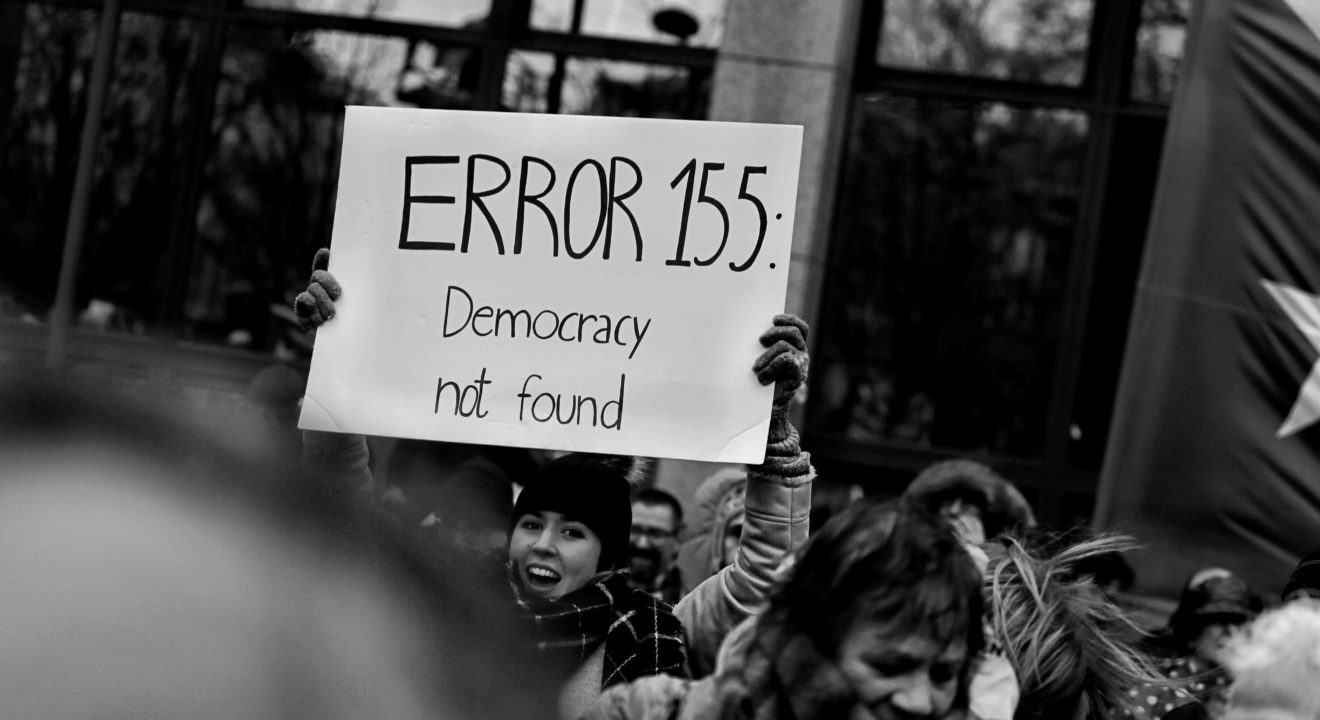Politics June 21, 2018
Because your vote counts but so does your voice!


It’s easy to feel democratically steamrolled by Super PACs and corporate donors. Many of us feel disheartened by the 2016 election. We feel that our individual voices and political perspectives are not being heard or represented. We feel like our one vote is not enough to make an impact. This is one of the reasons why half of all eligible voters did not vote in the 2016 presidential election.
In this time of such heightened political tensions, it’s more important than ever that we fight apathy. If you don’t like what your elected officials are doing, hold them accountable. If you disagree with a particular legislation, challenge it.
A common misconception is that “democratic involvement” is simply voting for president. But political involvement extends far beyond just the presidential vote every four years. It’s important that we recognize our power to participate politically. Here are 25 ways to get democratically involved and amplify your voice.
Voting is the best way to ensure your voice is not only heard but counted. It may be the most obvious, but it is a necessary pillar to democratic involvement. In order to vote you need to be registered. Being a registered voter allows you to participate in so many more activities than just voting for candidates. You can join a political party and vote on referendums. Being a registered voter also gives you more leverage to hold your representatives accountable. So register to vote; It’s as easy as clicking a few buttons.
Register to vote online.
There are many ways to invest your time and energy into the democratic system. Some of those ways include volunteering to help register people to vote or volunteering to help run polling stations. Whatever you can do to help get others out and voting or to streamline the process is a great way to support democracy.


The first step to ensuring government accountability is knowing your elected officials. Stay informed on who is representing you and what issues they support. The most basic level of accountability is being aware of who is enacting the legislation that will impact you and your community.
Find out who your elected officials are by clicking here.
Just knowing who it is that is making important decisions on your behalf isn’t enough. Contact them. Tell your representatives about legislation you support or want repealed. Also, tell them how you want them to vote on upcoming bills. Voice your support and voice your anger. Make your opinions known. After all, it’s their job to act out of the interest of their constituents.
Click here to contact your local, state or federal representatives.
In many states, your presidential or midterm ballot also includes referendums that voters can weigh in on. Policies being altered are made accessible to citizen input. This is a great opportunity to contribute to the political decision-making process, but these referendums are often worded in a convoluted and confusing manner. They are often so difficult to decipher that they have the potential to discourage citizen input on them.
Read up on the referendums in advance. Know what you’re up against so that when the time comes you can vote without fear of misunderstanding what the ballot is asking.
Political involvement doesn’t have to take place on the federal or state level. Oftentimes local politics will have just as much an impact on your day to day life, if not more than federal politics. Be an active member of your community. Make your voice heard in the local decision-making process, or at least learn about local legislation and issues. Town halls are also a great way to meet your local representatives. Be a part of the process in your city or town.
Simply google “town hall” and your city or neighborhood’s name and you should find a website that lists upcoming meetings.
City council meetings generally take place as monthly or bimonthly forums. At these meetings you have a chance to hear officials, such as city managers and public safety administrators speak on issues impacting the community. Learn about the issues that are impacting your community and what the officials in your community are doing about them.
City council meetings also generally include an open forum section where members of the community can address the council and voice questions or concerns. City council meetings are a great way to keep your local and lower-level representatives accountable.
If you support the platform of a particular party and tend to vote for candidates of that party but you aren’t an official member—become one! Backing a specific party is often much more effective when you’re an official member. In many states, you can only vote in election primaries and caucuses if you are a registered member of that party. Help your party in any way you can.
If you don’t support either the Democrat or Republican Party you can also register as an independent or with another minor party. Whatever your affiliation, there are benefits to officially declaring your party.


Go beyond supporting your party, back a candidate who you believe in. If there’s a candidate you support volunteer for their campaign. Helping someone you support get elected is one of the most empowering things you can do. You can influence political decisions by putting like-minded people in office.
Your candidate has a campaign website. Contact the campaign and see what you can do to help.
If you don’t have time to volunteer, then donate to a candidate you like. It may seem like your donations won’t count in a system of corporate donors and super PACs, but they can. Even a small amount of money helps because it all adds up. In the 2016 election, candidate Bernie Sanders made a strong stance against super PACs. Senator Sanders ran a campaign funded entirely on individual donations and came extremely close to ensuring the DNC nomination for president. Campaigning is expensive and most candidates don’t have the funds to sustain the financial burden of running for office on their own. So if you believe strongly in a candidate give what you can to help their campaign.
Your candidate has a campaign website. The donate button won’t be hard to find.
Political involvement boils down to finding a cause you care about. Politics are about the issues, and becoming invested in one or more issues serves as a starting-off point for getting more involved. Finding something that you’re passionate about. Then go out and support organizations and candidates that back your cause.


Once you find a cause you care about, get vocal about it. Inform your friends, family and coworkers. Raise awareness on social media. Start a petition or a crowdfunding campaign to raise awareness and money for that cause. Change starts with you and it starts from communities of people banding together for an issue they care about. Ignite that force!
MoveOn is a great website to help you start a petition and you can launch a crowdfunding campaign on gofundme.com.
Volunteer work doesn’t necessarily need to be in the political sphere for it to be political. Working for a cause, no matter what it is, is inherently political. If you are working against a problem or fighting for change you are getting involved democratically.
Investing your time and energy into a cause that is important to you shows the world what you think the important issues are and what needs to be fixed in society. It raises awareness and it pushes for change.
Coming together as a group is a great way to rally support for a cause and create a sense of solidarity. Change comes from the masses. Rallies or events are a great way to support a movement. It shows those in power the issues that the public cares about. Our voices are louder together!
Rallies and political events don’t happen that often. While the issue may have support, the community needs to show that support. Be the one to mobilize it. Don’t wait for someone else to bring a cause into the public eye or to take political action—do it yourself. Spread the word and create an event to support a cause, get people interested and get people talking.
Don’t become apathetic when it comes to corrupt politicians or harmful legislation. Mobilize and raise your voice against government corruption. Be a part of a group speaking up about the issues. Make the voices of the masses heard. Make sure that representatives are really representing the people.
Watching candidates address hard-hitting questions on the spot is often the most telling way to learn what their values really are. You can see what the candidates value most, and see who supports the issues you support. Debates are also a great way to witness the candidates go head to head. It’s easier to compare their different knowledge bases, skills and platforms when they’re debating directly.
These types of debates are rampant during presidential elections and primary seasons. There is no shortage of debates between those vying for the presidency. However, smaller elections also often host debates as well. Governors may face off to secure voter support.
While these types of debates are most common during election seasons, there doesn’t necessarily need to be an upcoming election for a debate. In 2017, Senators Ted Cruz and Bernie Sanders held a public debate on healthcare reform to draw attention to the issue.
Whether it be a paper, TV, radio or podcasts keep up on whats happening in the news. Get the facts to make informed political decisions. You can also hear the perspectives of politicians and activists on the news. It’s a great way to identify candidates and organizations you support, as well as candidates and organizations you want to fight.
If you feel intimidated by the news, watching comedy shows like John Oliver’s Last Week Tonight or the Daily Show are easy fun ways to stay up to date on whats going on. You can also sign up to receive news updates on your phone. Popular news apps such as CNN or Apple News are free and easy to read on your phone. These apps usually also have a feature that, if enabled, will automatically notify you of important breaking stories. Apps are a great way to stay up-to-date in a digitalized world.
Don’t just vote for president. Become a part of electing your county and city governments. Local elections decide positions, such as sheriffs, mayors and school board members. Representation starts on the small scale. We can’t overlook the importance of local representatives. Voting for president is important, but so is voting for community representation.
Policy making doesn’t just happen on a federal level. In fact, a lot of legislation is decided by your state government. It’s important to keep yourself involved politically on the state level as well. Keep up with state elections and stay informed on who your representatives are.
Federal voting isn’t said and done at the four-year mark. House and Senate seats go up for re-election during midterm season at the two-year mark. Flipping the ruling party of either branch can drastically alter federal politics and keep the checks and balances of presidential power accountable.
Many people voiced their distaste at the candidate selection for the 2016 presidential race—Trump or Hillary. While those were the two options on the final ballot, they weren’t the only options at the offset. There were many candidates vying for the major party nominations and primary and caucus votes determine the outcome.
Voting in primaries and caucuses is instrumental in deciding who takes the presidency. Many of those who did not vote during primary season expressed their dissatisfaction with the party candidates. You can’t complain about who the party puts forward if you have taken no steps to be a part of the selection process.
While there are so many ways to get involved democratically, voting for president and Congress is still important. With almost half of the population abstaining from voting in 2016, it’s a factor of political involvement we can’t ignore. We have to vote. We have to keep elected officials accountable, and we have to be a part of the democratic process if we want to continue calling our country a democracy.


While it’s great to be able to say that you’ve voted, it doesn’t do anything to combat an underlying mindset that voting just doesn’t matter. Convince others that it does. Convince the 46% of non-voters of the power they have to influence election results. You can start with those close to you. Remind your family members, friends, co-workers or classmates to vote!
If you’re not happy with the decisions being made and your choices for representation, then consider running for office yourself. As the old mantra goes, “if you want something done right, you need to do it yourself.” A way to really ensure that your voice is heard politically is to place yourself into the political conversation. Put yourself out there as a candidate and make the changes yourself!